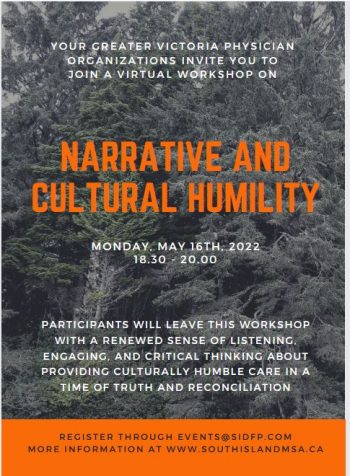Information
The 3rd in a 3-part series on Narrative Medicine, this workshop takes narrative into the realm of cultural humility. Through hands-on book-making, some easy mark-making exercises, and facilitated reading and writing activities, participants will leave this workshop with a renewed sense of listening, engaging, and critically thinking about providing culturally humble care in a time of Truth and Reconciliation. This workshop is committedly positive and supportive in tone and modes of engagement but is also focused on unsettling many taken for granted colonial ways of considering the world. This is a workshop about re/narrating a commitment to working together toward cultural humility, truth, and reconciliation now and in the future.
To register, please email events@sidfp.com
Facilitated by: Mona Maleki, Catherine Courteau, Mei Wen, Darian Goldin Stahl, and Sarah de Leeuw.
What is “narrative medicine”?
- It’s an approach to medicine that values, open spaces for, and recognizes people’s narratives (their stories and accounts that follow a narrative arc) in clinical practice, research, and education as a way to promote healing. It is an interdisciplinary approach that uses deep listening and creativity from the humanities and the arts to address the needs of all who seek and deliver healthcare. Narrative medicine enables patients and caregivers to voice experiences, to be heard, to be recognized, and to be valued.
Is there any evidence for this?
- Narrative medicine is tied to medical and health humanities. You might be interested in the 2021 Report by the Association of American Medical Colleges (AAMC) “The Fundamental Role of the Arts and Humanities in Medical Education” which includes evidence about narrative medicine: https://store.aamc.org/the-fundamental-role-of-the-arts-and-humanities-in-medical-education.html. “Ground zero” for narrative medicine, from where much of the evidence about narrative medicine originates, is at Columbia University: https://www.mhe.cuimc.columbia.edu/our-divisions/division-narrative-medicine
What is cultural humility?
- According to the First Nations Health Authority,
- Cultural safety is an outcome based on respectful engagement that recognizes and strives to address power imbalances inherent in the health care system. It results in an environment free of racism and discrimination, where people feel safe when receiving health care.
- Cultural humility is a process of self-reflection to understand personal and systemic biases and to develop and maintain respectful processes and relationships based on mutual trust. Cultural humility involves humbly acknowledging oneself as a learner when it comes to understanding another’s experience.
What am I going to do this evening?
- You’re not going to be handed a series of facts. You don’t need any previous writing or narrative medicine exposure. You’re going to experience and participate. You’re going to write. You don’t have to share what you write, but you can!
What do I need?
- You need a willingness to think and to feel. You need a willingness to be reflective. Some paper and a pen are important “tools”. Typing on your laptop/tablet/phone will work, but our sense is that good ol’ pens and paper are best for this event.
What is the takeaway?
- An introduction to an emerging interdisciplinary approach incorporating humanities into clinical practice. A chance to explore the concept of your own narrative story and connect with colleagues. A tool to take into your day-to-day practice as a provider.

